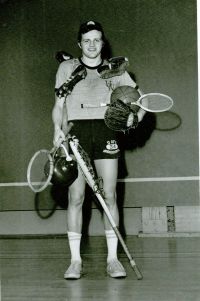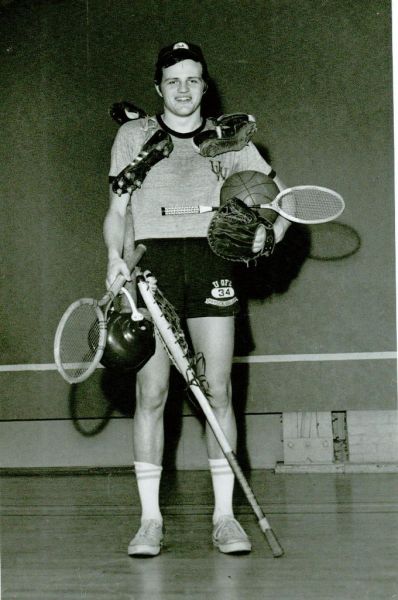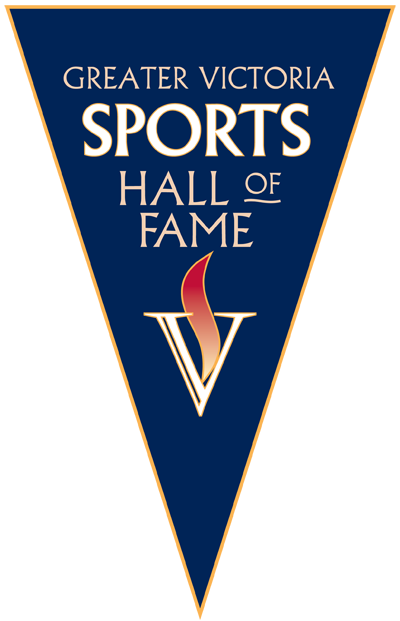A five sport athlete in baseball, basketball, football, rugby and lacrosse, Chris starred on many junior and senior teams in Victoria before turning his focus to lacrosse in his mid-twenties.
In basketball Chris was a national junior all star and MVP with the Victoria Chinooks and UVic Junior Varsity then went on to star with the Vikings and later the Senior Men's Scorpions and Datatech teams. In football, Chris was an outstanding receiver and kicker with the BC Football Conference Dolphins and was named to the all-time Victoria team. In rugby, Chris first played for Velox then moved on to first division with the James Bay Athletic Association. In baseball, Chris was an infielder with the Victoria Senior Amateur All Stars and spent a year in the Southern Baseball League with Swift Current just prior to being drafted by the Boston Bolts of the National Lacrosse League in 1975.
From that point, Chris launched a storied career in Canada's National Summer Sport. He spent nine years as a player and ten years as Head Coach of the Victoria Shamrocks, winning three Mann Cups along the way, and is a member of the Shamrocks Wall of Fame. In field lacrosse, Chris co-founded the senior A Men's Victoria Seasprays/Royal Waxmen Club that set lacrosse history in Canada by winning 14 Ross Cup national championships. The team also went on to win three North American Brogden Cup Championships and was inducted into the Canadian Lacrosse Hall of Fame in 2011.
Chris was an outstanding defenseman with Canada's National Field Lacrosse Team through three World Championships, winning two silver medals and a bronze, and was selected to the All World Team at the World Games in Los Angeles in 1984. He then went on to become Head Coach of the National Team through two more World Championships, winning a silver and bronze.
In box lacrosse, Chris was named Head Coach of the National Lacrosse League Calgary Roughnecks expansion team in 2002 and, in three years, won the NLL Championship. After six years in Calgary he went on to become Head Coach of the San Jose Stealth and won another NLL title when the team moved to Washington in 2012, becoming only the second coach in the history of the league to win titles with two different teams.
Chris spent 12 years as a Head Coach in the NLL, was a five-time All Star Game coach and retired this year as the 3rd all time wins leader. He was nominated and won election as an NLL Hall of Fame inductee Class of 2014. Chris was also the Head Coach of Team England and has taken that country through the last two World Box Championships in Halifax and Prague. Along the way, Chris also found time to spearhead a committee to have field lacrosse accepted as the official Demonstration Sport of the 1994 Victoria Commonwealth Games, and chaired the Games Volunteer Recruitment and Orientation Committee responsible for the 15,000 Games volunteers.
Sponsored by Zieglers Janitorial (Jeevan Dillon)
Stephanie Dixon is an elite athlete, pure and simple. Her spirit, passion and drive are what separate her from the rest of the pack. Despite being born with only one leg, Stephanie has trained and competed against able-bodied athletes at the local, provincial, and national level and she is almost without peer in her athletic career.
Before her commitment to swimming, Stephanie was involved in many sports including baseball, gymnastics, diving, skiing and horseback riding. Her parents wanted her to be involved in as many physical activities as possible while growing up, so that she would know that even though she looked a little different than everyone else, she was still able to do anything anyone could do. Their strategy worked and then some.
Stephanie has commented that:
"Swimming has always been my passion. From the moment I was introduced to it at the age of two, I loved being in the water and that love has never faded. Having been born missing my right leg and hip, overcoming obstacles and challenges has always been part of my life, but being challenged changed at some point from a way of life to a passion. I absolutely loved it when someone doubted me based on my disability because I then had the opportunity to prove myself. Having a love for the water and for challenges, joining competitive swimming seemed to be the perfect thing for me to do."
Stephanie started competitive swimming when she was 13 years old and at her very first competition, an official informed her that she should get classified and go to special meets to compete against other swimmers at her ability level. This was her introduction to the world of SWAD (Swimmers with a Disability).
At the age of 16 at the 2000 Paralympics in Sydney she won five gold medals, all world records -- setting a new Canadian record for most gold medals won at a single Games. Representing her country again at the 2004 Paralympics in Athens, she won one gold, six silver, and one bronze, setting a new world record in the 100 metre backstroke. In 2008 Paralympic Games in Beijing, Stephanie won gold, silver and bronze, and once again broke her world record mark in the 100 metre backstroke.
In 2003, Stephanie moved from Toronto to Victoria to pursue a degree in Psychology and compete for the UVic varsity swim team. She represented the university against able-bodied athletes after qualifying for the Canadian University Championships. She placed 16th in the 200 metre backstroke while setting a new world record in her Para category. For the accomplishment, Stephanie was named the University of Victoria Athlete of the Year in 2005, a title she won again in her second year.
While Stephanie has been out of competition since 2010, she left the sport with 19 Paralympic medals (7 gold, 10 silver, and 2 bronze) and still holds the World Record in her Para category for the 50, 100, and 200 metre backstrokes.
There can be no argument with her observation:
"The nature of sport is competition and challenge, competing and challenging yourself to become the best athlete possible and to bring the best out of yourself. The bottom line is that I am an athlete trying to do just that. Not a SWAD athlete and not an able-bodied athlete, but an athlete… period."
Sponsored by Pacific Coast Swimming / UVic VIKES


















